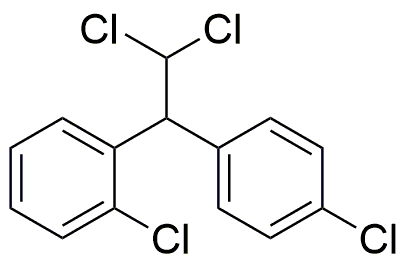Mitotane is widely utilized in research focused on:
- Adrenocortical Carcinoma Treatment: It is primarily used in the treatment of adrenal gland cancer, helping to reduce tumor size and manage symptoms effectively.
- Hormonal Regulation Studies: Researchers use Mitotane to study its effects on hormone production, particularly cortisol, providing insights into adrenal function and disorders.
- Drug Interaction Research: It serves as a model compound in pharmacology to investigate interactions with other medications, enhancing understanding of drug metabolism and safety profiles.
- Animal Models in Oncology: Mitotane is employed in preclinical studies using animal models to evaluate new therapies for adrenal tumors, aiding in the development of innovative treatments.
- Clinical Trials: It plays a crucial role in clinical trials aimed at improving treatment protocols for adrenal cancer, offering potential benefits over traditional therapies.
General Information
Properties
Safety and Regulations
Applications
Mitotane is widely utilized in research focused on:
- Adrenocortical Carcinoma Treatment: It is primarily used in the treatment of adrenal gland cancer, helping to reduce tumor size and manage symptoms effectively.
- Hormonal Regulation Studies: Researchers use Mitotane to study its effects on hormone production, particularly cortisol, providing insights into adrenal function and disorders.
- Drug Interaction Research: It serves as a model compound in pharmacology to investigate interactions with other medications, enhancing understanding of drug metabolism and safety profiles.
- Animal Models in Oncology: Mitotane is employed in preclinical studies using animal models to evaluate new therapies for adrenal tumors, aiding in the development of innovative treatments.
- Clinical Trials: It plays a crucial role in clinical trials aimed at improving treatment protocols for adrenal cancer, offering potential benefits over traditional therapies.
Documents
Safety Data Sheets (SDS)
The SDS provides comprehensive safety information on handling, storage, and disposal of the product.
Product Specification (PS)
The PS provides a comprehensive breakdown of the product’s properties, including chemical composition, physical state, purity, and storage requirements. It also details acceptable quality ranges and the product's intended applications.
Certificates of Analysis (COA)
Search for Certificates of Analysis (COA) by entering the products Lot Number. Lot and Batch Numbers can be found on a product’s label following the words ‘Lot’ or ‘Batch’.
Numéro de catalogue
Numéro de lot/série
Certificates Of Origin (COO)
This COO confirms the country where the product was manufactured, and also details the materials and components used in it and whether it is derived from natural, synthetic, or other specific sources. This certificate may be required for customs, trade, and regulatory compliance.
Numéro de catalogue
Numéro de lot/série
Safety Data Sheets (SDS)
The SDS provides comprehensive safety information on handling, storage, and disposal of the product.
DownloadProduct Specification (PS)
The PS provides a comprehensive breakdown of the product’s properties, including chemical composition, physical state, purity, and storage requirements. It also details acceptable quality ranges and the product's intended applications.
DownloadCertificates of Analysis (COA)
Search for Certificates of Analysis (COA) by entering the products Lot Number. Lot and Batch Numbers can be found on a product’s label following the words ‘Lot’ or ‘Batch’.
Numéro de catalogue
Numéro de lot/série
Certificates Of Origin (COO)
This COO confirms the country where the product was manufactured, and also details the materials and components used in it and whether it is derived from natural, synthetic, or other specific sources. This certificate may be required for customs, trade, and regulatory compliance.


